| 30 December |
• yesterday • tomorrow |
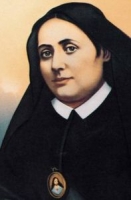
Third of six children born to Francesco Matteo and Carolina Mozzoni Frosconi. Eugenia's mother died when the girl was three, her father moved with some of the children to Genoa, Italy to find work, and Eugenia was raised in Milan by her pious aunt Marietta Anselmi. The family reunited in Genoa in 1852, but Eugenia's father died in March 1855, and she moved in with her pious relatives Luigi and Elisa Ravasco (and their ten children).
Eugenia grew up in a time when opposition to the Church and the clergy was on the rise, and Freemasons actively opposed the Catholic hierarchy. Her family, however, including her extended one, were open about their faith, and active in their parish life; Eugenia made her First Communion and Confirmation on 21 June 1855, and began a habit of frequent prayer.
In December 1862, uncle Luigi died, and Eugenia took over care of the family. The pious home continued in turmoil as her brother, Ambrose, join the anti-clerical forces. Her remaining family wanted Eugenia to marry, but she felt a call to religious life, and during a mission on 31 May 1863, the young woman felt a strong desire to enter a vocation dedicated to the Sacred Heart of Jesus. With the help of her spiritual director she began teaching catechism and helping poor girls, especially those who lived on the street. Other young women joined in her work, and on 6 December 1868, with the help of Canon Magnasco, she founded the Sisters of the Sacred Hearts of Jesus and Mary (Ravasco Institute) to teach catechism and open secular schools for the poor.
Mother Eugenia served the rest of her life as first Supererior to the Congregation and worked with great courage in the face of growing anti-clerical persecution in her region. She travelled Italy, France and Switzerland to start new communities, teach, give direction to new sisters, and correct the anti-Catholic press. The Congregation received diocesan approval in 1882, the first group of sisters made their perpetual profession in 1884, and they received papal approval in 1909. Today the Sisters work in Albania, Italy, Switzerland, Argentina, Bolivia, Chile, Colombia, Mexico, Paraguay, Venezuela, Africa and the Philippines in schools, parishes and missions, dedicated to youth, the poor, and promoting the dignity of women.
4 January 1845 at Milan, Italy
30 December 1900 at Genoa, Italy of natural causes
27 April 2003 by Pope John Paul II
Live in abandonment to God and in the hands of Mary Immaculate. - Blessed Eugenia
Blessed Eugenia Ravasco was wholly concerned with spreading love for the Hearts of Christ and Mary. Contemplating these two Hearts, she was passionately devoted to serving her neighbour and joyfully devoted her whole life to young people and the poor. With foresight, she was able to open herself to the pressing needs of the mission, with special concern for those who had "fallen away" from the Church. The words "doing good for love of the Heart of Jesus", and "burning with desire for the good of others, especially young people" neatly sum up the charism she bestowed on her institute. - Pope John Paul II, from his homily during the beatfication of Blessed Eugenia
https://catholicsaints.info/blessed-eugenia-ravasco/
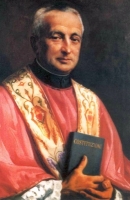
Father of the Poor
Eldest of ten children born to Gasparo Boccardo and Giuseppina Malerba; his was a pious family - he was baptized at one day of age, three of his brothers became priests, one of them Blessed Luigi Boccardo. He studied with the Barnabites, graduating from their high school in 1864, and then the diocesan seminary. Ordained on 3 June 1871 in the archdiocese of Turin, Italy. Giovanni was drawn to religious life, but was assigned to work in seminary, first teaching and then becoming the spiritual director of young seminarians in Chieri, Italy in 1873 and then in Turin. Received a doctorate in theology on 1 February 1877. Honorary canon of the church of Santa Maria della Scala in Chieri. Friend of Saint John Bosco, Saint Leonard Murialdo, and Blessed Joseph Allamano. Parish priest in Pancalieri, Italy in 1882 where he spent the rest of his life as a beloved pastor, caring especially for the sick and the poor, filling in at other parishes, ensuring religious education of children, and maintaining a prison ministry. Working with the sick during a cholera epidemic in 1884 impressed on Giovanni the need for better medical care for the poor; he founded a hospice for the impoverished sick on 6 November 1884. Founded the Poor Daughters of Saint Cajetan with a mission to care for the poor sick, the long term sick, sick priests, the elderly and the neglected; their work continues today in Italy, Brazil, Benin and Argentina. In 1911 Father Giovanni was stricken with a form of paralysis that eventually led to his reluctantly giving up all areas of ministry his final two years. His private writings on matters spiritual runs to 44 volumes.
20 November 1848 in Ca'Bianca, Moncalieri, Turin, Italy
• 30 December 1913 in Moncalieri, Turin, Italy of natural causes
• re-interred at the mother house of the Poor Daughters of Saint Cajetan in Pancalieri, Italy in 1924
• 24 May 1998 by Pope John Paul II
• the beatification miracle involved the complete healing from cancer of 80-year-old Lina Alvez De Oliveira of Sao Paolo, Brazil on 12 February 1968
against cancer
https://catholicsaints.info/blessed-giovanni-maria-boccardo/
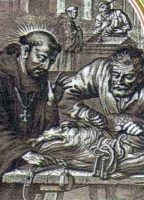
• Egwin of Evesham
• Ecgwin, Ecgwine, Eegwine, Egvino, Egwinus
• 10 September (translation of his relics)
• 11 January (translation of his relics)
English nobility, and the descendant of Mercian kings. Consecrated to God in his youth. Benedictine monk. Bishop of Worcester, England from 692 to 711.
There was a need in his diocese for some reform, but Egwin let it get out of hand, and he was charged with being too severe with his priests. To answer the charges, give everyone a chance to cool off, and show his repentance for any harm done, he made a penitial pilgrimage to Rome. Legend says that he locked his feet in shackles and threw the key into the River Avon; when he arrived in Rome the key was miraculously found in the belly of a fish he bought in the market.
Founded the Benedictine monastery of Evesham, England; the site was chosen because of an apparition of the Virgin Mary to a local herdsman. It became one of the great Benedictine houses of the Middle Ages.
7th century England
• 30 December 717 of natural causes
• buried at the monastery at Evesham, England
• relics translated for veneration in 1039
• relics translated again in 1077 when they were taken on tour throughout the region which drew enough donations to rebuild the monastery church
bishop holding a fish and a key
https://catholicsaints.info/saint-egwin-of-worcester/

• Margaret of Cortona
• Margarita, Margherita, Marguerite
Daughter of Prince Odo Colonna of Palestrina, Italy. Her parents died when Margaret was young, and she had to care for her two brothers, the youngest of whom grew to be Cardinal James Colonna in 1278. Having refused a marriage offer by the chief magistrate of Rome, Margaret retired from the world, and turned the family castle near Palestrina into a retreat where she passed her time in piety and penance. Noted for charity to the poor, which was more than once miraculously rewarded. Through the influence of her brother the cardinal, Margaret obtained papal approval for a community of Urbanist Poor Clares at her castle, where she became superioress. Suffered her last seven years from a terribly painful ulcer, which she used as a chance to demonstrate resignation. After her death, her community move to the convent of San Silvestro in Capite in Rome, Italy, from where they were driven to the convent of Santa Cecilia in Trastevere in Rome.
c.1255 at Palestrina, Rome, Italy
• 30 December 1284 at Castel San Pietro, Rome, Italy of natural causes
• relics at the convent of Santa Cecilia in Trastevere, Rome
17 September 1847 by Pope Pius IX (cultus confirmed)
https://catholicsaints.info/blessed-margaret-colonna/
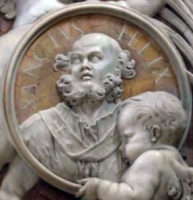
Son of Constantius; little else is known of his early life. Chosen 26th pope in 269. Believed to have given sanction to the ancient practice of celebrating anniversary Masses at the graves of martyrs. First to condemn the heresy spread by Paul of Samosata which taught that Christ was a mere man used as a puppet by God. Suffered through the persecutions of Aurelian, working personally to bring non-Christians to the faith. Some old records indicate that he was a martyr, the reason for his inclusion on early calendars of the saints, but they were apparently in error, confusing him with another Felix of the era.
in Rome, Italy
269
274
pope with an anchor
https://catholicsaints.info/pope-saint-felix-i/
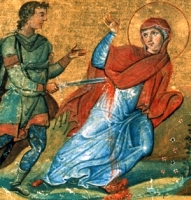
Anysia of Thessalonica
Born to a wealthy and pious family, Anysia lived private vows of chastity and poverty, praying and using her wealth to help the poor. One day a Roman soldier accosted her as she was on her way to services. When he discovered she was a Christian, possibly she crossed herself in fear, he beat her, and said was going to drag her to a pagan temple and force her to make a sacrifice. When he tore off the veil she habitually wore as a sign of her chastity, she spit in his face; he murdered her.
in Salonika, Thessaly, Greece
stabbed with a sword on 30 December 304
https://catholicsaints.info/saint-anysia-of-salonika/
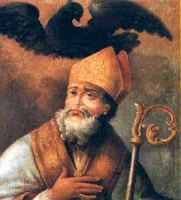
Roger
Pious youth. Deacon. Reluctant bishop of Canne, Italy at age 30. Legend says that when he travelled his diocese, an eagle flew above him to shelter him from the weather.
mid-11th century
• 30 December 1129 of natural causes
• buried in the cathedral in Canne, Italy
• relics transferred to Barletta, Italy in 1276
• Barletta, Italy
• Trani-Barletta-Bisceglie, Italy, archdiocese of
• crosier
• eagle
https://catholicsaints.info/saint-ruggero-of-canne/
Germer, Geremar, Geremaro
Born to the Frankish nobility, he was educated in Beauvais, France. Worked with Saint Eloi. Part of the court of King Dagobert I. Married. Father. Advisor to King Clovis II. With his wife's consent, he retired to the abbey of Pentale on the Seine in France. Abbot at Pentale, but he was so severe with his monks that a group tried to kill him. He resigned, then retired to become a hermit in a cave near the abbey. Founded Flay Abbey between Beauvais and Rouen in France in 655; it was later renamed Saint-Germer in his honour.
7th century at Beauvais, France
c.658 at Flay Abbey, France of natural causes
https://catholicsaints.info/saint-geremarus/
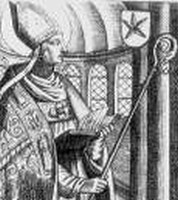
Perpet, Perpetue, Perpetuo
Related to Saint Eustachius of Tours and Saint Volusianus of Tours. Bishop of Tours, France for 30 years. Restored ecclesiastical discipline in his suffragan dioceses to the point that unworthy priests were removed from service. Built churches and monasteries.
c.490
https://catholicsaints.info/saint-perpetuus-of-tours/
Anysius of Salonika
Bishop of Thessalonica, Macedonia in 383, he was involved in the political and religious struggles of the time. Vicar apostolic of Illyricum. Defended Saint John Chrysostom during that saint's exile. Highly regarded by his peers, Saint John Chrysostom, Saint Ambrose of Milan, Pope Saint Innocent I, and Pope Saint Leo the Great.
c.410
https://catholicsaints.info/saint-anysius-of-thessalonica/
• Richard of Arnsberg
• Richard of Anglicus
Member of the Premonstratensians. Canon of the Norbertine monastery of Wedinghausen in Arnsberg, Germany. Theological writer.
early 12 century in Germany
c.1190 at the Norbertine monastery of Wedinghausen in Arnsberg, Germany of natural causes
https://catholicsaints.info/blessed-richard-of-wedinghausen/
Radulphe, Ralph, Raul, Rodulphe
Benedictine Cistercian monk and spiritual student of Saint Bernard at Clairvaux Abbey. Sent by Bernard to found and govern a Cistercian abbey of Vaucelles, diocese of Cambrai, France.
in England
1152 of natural causes
https://catholicsaints.info/blessed-raoul-of-vaucelles/
Rainer, Raniero, Rainerius
Bishop of Forconium (modern Aquila), Abruzzi region, Italy. Noted for his excellent administrative skills, but no details about the man have survived.
1077 of natural causes
by Pope Honorius III
https://catholicsaints.info/saint-raynerius-of-aquila/
Ermete, Hermas
Exorcist. Martyr.
c.300 in Moesia (in modern Bulgaria)
• man on horseback exorcising a devil from a woman holding a rope
• man on horseback exorcising a devil from a woman holding a child
https://catholicsaints.info/saint-hermes-of-moesia/
Monk. Archbishop of Esztergom, Hungary in 1002. Worked with Saint Stephen to evangelize the Hungarian people.
c.1036
https://catholicsaints.info/saint-sebastian-of-esztergom/

Eugenius
Bishop of Milan, Italy.
https://catholicsaints.info/saint-eugene-of-milan/
One of the first bishops of the diocese of Ravenna, Italy.
c.200 of natural causes
https://catholicsaints.info/saint-liberius-of-ravenna/
A group of Christians martyred in the unrest caused by Monophysite heretics. We know the names for five of them - Appian, Donatus, Honorius, Mansuetus and Severus.
c.483 at Alexandria, Egypt
https://catholicsaints.info/martyrs-of-alexandria-30-december/
A group of Christians martyred together, date unknown. The only details to have survived are the names - Cletus, Florentius, Papinianus, Paul, Serenusa and Stephen.
Oia, Greece
https://catholicsaints.info/martyrs-of-oia/
A group of Christians martyred in the persecutions of Diocletian - Exuperantius, Marcellus, Sabinus and Venustian.
303 in Spoleto, Italy
https://catholicsaints.info/martyrs-of-spoleto-30-december/
• Elias of Conques
CatholicSaints.Info Portable Edition